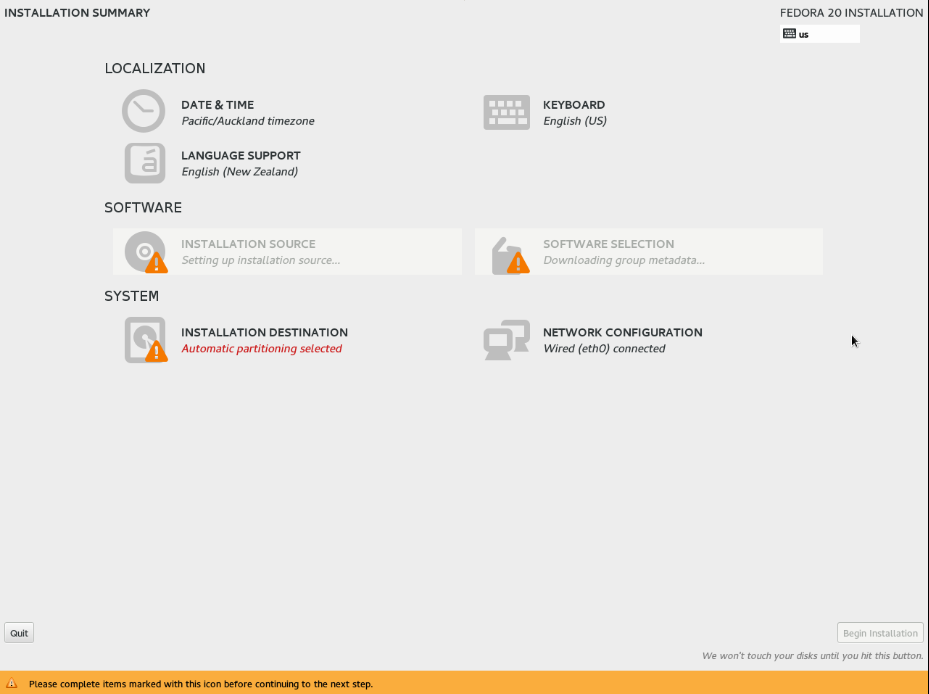I’ve just returned from my annual pilgrimage to linux.conf.au, which was held in Perth this year. It’s the first time I’ve been over to West Australia, it’s a whole 5 hour flight from Sydney – longer than it takes to fly to New Zealand.
Perth’s climate is a very dry heat compared to Sydney, so although it was actually hotter than Sydney for most of the week, it didn’t feel quite as unpleasant – other than the final day which hit 45 degrees and was baking hot…
It’s also a very clean/tidy city, the well maintained nature was very noticeable with the city and gardens being immaculately trimmed – not sure if it’s always been like this, or if it’s a side effect of the mining wealth in the economy allowing the local government to afford it more effectively.

The towering metropolis of mining wealth.
As usual, the conference ran for 5 full days and featured 4-5 concurrent streams of talks during the week. The quality was generally high as always, although I feel that content selection has shifted away from a lot of deep dive technical talks to more high level talks, and that OpenStack (whilst awesome) is taking up far too much of the conference and really deserves it’s own dedicated conference now.
I’ve prepared my personal shortlist of the talks I enjoyed most of all for anyone who wants to spend a bit of time watching some of the recorded sessions.
Interesting New(ish) Software
- RatticDB – A web-based password storage system written in Python written by friends in Melbourne. I’ve been trialling it and since then it’s growing in popularity and awareness, as well as getting security audits (and fixes) [video] [project homepage].
- MARS Light – This is an insanely awesome replacement for DRBD designed to address the issues of DRBD when replicating over slower long WAN links. Like DRBD, MARS Light is a block-level replication, so ideal for entire datacenter and VM replication. [video] [project homepage].
- Pettycoin – Proposal/design for an adjacent network to Bitcoin designed for microtransactions. It’s currently under development, but is an interesting idea. [video] [project homepage].
- Lua code in Mediawiki – the Mediawiki developers have added the ability for Wikipedia editors to write Lua code that is executed server side which is pretty insanely awesome when you think about how normally nobody wants to allow untrusted public the ability to remote execute code on systems. The developers have taken Lua and created a “safe” version that runs inside PHP with restrictions to make this possible. [video] [project homepage].
- OpenShift – RedHat did a demonstration on their hosted (and open source) PAAS platform, OpenShift. It’s a solution I’ve been looking at before, if you’re a developer whom doesn’t care about infrastructure management, it looks very attractive. [video] [project homepage].
Evolution of Linux
- D-Bus in the Kernel – Lennart Pottering (of Pulseaudio and SystemD fame) presented the efforts he’s been involved in to fix D-Bus’s shortcomings and move it into the kernel itself and have D-Bus as a proper high speed IPC solution for the Linux kernel. [video]
- The Six Stages of SystemD – Presentation by an engineer who has been moving systems to SystemD and the process he went through and his thoughts/experience with SystemD. Really showcases the value that moving to SystemD will bring to GNU/Linux distributions. [video]
- Development Tools & The UNIX Philosophy – Excellent talk by a Python developer on how we should stop accepting command-line only tools as being the “right” or “proper” UNIX-style tools. Some tools (eg debuggers) are just better suited for graphical interfaces, and that it still meets the UNIX philosophy of having one tool doing one thing well. I really like the argument he makes and have to agree, in some cases GUIs are just more suitable for some tasks. [video]
Walkthroughs and Warstories
- TCP Tuning for the Web – presented by one of the co-founders of Fastly showing the various techniques they use to improve the performance of TCP connections and handle issues such as DDOS attacks. Excellent talk by a very smart networking engineer. [video]
- Massive Scaling of Graphite – very interesting talk on the massive scaling issues involved to collect statistics with Graphite and some impressive and scary stats on the lifespans and abuse that SSDs will tolerate (which is nowhere near as much as they should!). [video]
- Maintaining Internal Forks – One of the FreeBSD developers spoke on how his company maintains an internal fork of FreeBSD (with various modifications for their storage product) and the challenges of keeping it synced with the current releases. Lots of common problems, such as pain of handling new upstream releases and re-merging changes. [video]
- Reverse engineering firmware – Mathew Garrett dug deep into vendor firmware configuration tools and explained how to reverse engineer their calls with various tools such as strace, IO and memory mapping tools. Well worth a watch purely for the fact that Matthew Garrett is an amazing speaker. [video]
- Android, The positronic brain – Interesting session on how to build native applications for Android devices, such as cross compiling daemons and how the internal structure of Android is laid out. [video]
- Rapid OpenStack Deployment – Double-length Tutorial/presentation on how to build OpenStack clusters. Very useful if you’re looking at building one. [video]
- Debian on AWS – Interesting talk on how the Debian project is using Amazon AWS for various serving projects and how they’re handling AMI builds. [video]
- A Web Page in Seven Syscalls – Excellent walk through on Varnish by one of the developers. Nothing too new for anyone who’s been using it, but a good explanation of how it works and what it’s used for. [video]
Other Cool Stuff
- Deploying software updates to ArduSat in orbit by Jonathan Oxer – Launching Arduino powered satelittes into orbit and updating them remotely to allow them to be used for educational and research purposes. What could possibly be more awesome than this? [video].
- HTTP/2.0 and you – Discussion of the emerging HTTP/2.0 standard. Interesting and important stuff for anyone working in the online space. [video]
- OpenStreetMap – Very interesting talk from the director of OpenStreetMap Team about how OpenStreetMap is used around disaster prone areas and getting the local community to assist with generating maps, which are being used by humanitarian teams to help with the disaster relief efforts. [video]
- Linux File Systems, Where did they come from? – A great look at the history and development cycles of the different filesytems in the Linux kernel – comparing ext1/2/3/4, XFS, ReiserFS, Btrfs and others. [video]
- A pseudo-random talk on entropy – Good explanation of the importance of entropy on Linux systems, but much more low level and about what tools there are for helping with it. Some cross-over with my own previous writings on this topic. [video]
Naturally there have been many other excellent talks – the above is just a selection of the ones that I got the most out from during the conference. Take a look at the full schedule to find other talks that might interest, almost all sessions got recorded during the conference.

